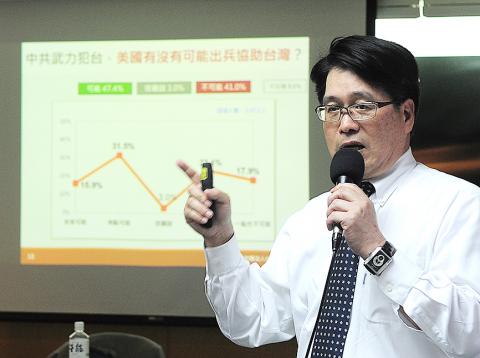The majority of Taiwanese do not think that China’s People’s Liberation Army (PLA) would invade Taiwan, a poll showed yesterday, with only 25.7 percent thinking such a scenario was likely.
The Taiwanese Public Opinion Foundation’s latest monthly survey found that 64.5 percent of respondents do not think such an attack is very likely.
Asked if the US was likely to send troops to help defend Taiwan in the event of a Chinese attack, 47.4 percent of respondents said they were confident of such support, but 41 percent said they had doubts.

Photo: Wang Yi-sung, Taipei Times
However, only 27.1 percent think the nation’s military would be able to repel any a PLA invasion, while 65.4 percent said they were not confident.
The survey was conducted from Sunday to Tuesday last week, just before the PLA conducted a live-fire exercise in the Taiwan Strait on Wednesday.
The poll found that 86.1 percent of respondents believe such military exercises by China do not serve to improve cross-strait relations, while 3.3 percent think they do help.
The survey found that 37.4 percent of respondents support the idea of Taiwan’s independence, 25.7 percent prefer maintaining the “status quo” and 23.8 percent favor unification with China.
A little more than half of respondents, 50.3 percent, believe that President Tsai Ing-wen’s (蔡英文) recent visit to Swaziland — now known as the Kingdom of Eswatini — did not help boost the nation’s international visibility, while 40.3 percent believe that it did.
The poll also found that 69.9 percent of respondents are dissatisfied with the nation’s international position and diplomatic situation, while 20.1 percent are satisfied.
In response to the statement: “Cross-strait relations are more important than diplomatic relations and to prevent provoking the Chinese Communist Party, it would be best for Taiwan to stop any efforts to boost its international position,” 65.6 percent of the respondents disagreed and 23.5 percent agreed.
Tsai’s public approval rating has dropped to 32 percent, a decline of 1.5 percentage points from a similar poll last month, and the third-lowest level since she took office on May 20, 2016, the poll found.
Her disapproval rating has climbed 2 percentage points to 49 percent since last month’s poll.
Former minister of national defense Michael Tsai (蔡明憲), who attended the foundation’s news conference on the poll results, said that the president should be more flexible in maintaining the “status quo.”
She could write a letter to the WHO and the UN secretary-general to express Taiwan’s desire and determination to join these organizations, he said.
Tsai Ing-wen could also propose a visit to the US in the wake of last month’s passage of the US’ Taiwan Travel Act, as her passiveness has been one of the reasons the public is dissatisfied with her, Michael Tsai said.
This month’s survey was conducted via telephone interviews among randomly selected adults over the age of 20. It collected 1,072 valid samples and had a margin of error of plus or minus 2.99 percentage points.

ENDEAVOR MANTA: The ship is programmed to automatically return to its designated home port and would self-destruct if seized by another party The Endeavor Manta, Taiwan’s first military-specification uncrewed surface vehicle (USV) tailor-made to operate in the Taiwan Strait in a bid to bolster the nation’s asymmetric combat capabilities made its first appearance at Kaohsiung’s Singda Harbor yesterday. Taking inspiration from Ukraine’s navy, which is using USVs to force Russia’s Black Sea fleet to take shelter within its own ports, CSBC Taiwan (台灣國際造船) established a research and development unit on USVs last year, CSBC chairman Huang Cheng-hung (黃正弘) said. With the exception of the satellite guidance system and the outboard motors — which were purchased from foreign companies that were not affiliated with Chinese-funded

PERMIT REVOKED: The influencer at a news conference said the National Immigration Agency was infringing on human rights and persecuting Chinese spouses Chinese influencer “Yaya in Taiwan” (亞亞在台灣) yesterday evening voluntarily left Taiwan, despite saying yesterday morning that she had “no intention” of leaving after her residence permit was revoked over her comments on Taiwan being “unified” with China by military force. The Ministry of the Interior yesterday had said that it could forcibly deport the influencer at midnight, but was considering taking a more flexible approach and beginning procedures this morning. The influencer, whose given name is Liu Zhenya (劉振亞), departed on a 8:45pm flight from Taipei International Airport (Songshan airport) to Fuzhou, China. Liu held a news conference at the airport at 7pm,

Taiwan was ranked the fourth-safest country in the world with a score of 82.9, trailing only Andorra, the United Arab Emirates and Qatar in Numbeo’s Safety Index by Country report. Taiwan’s score improved by 0.1 points compared with last year’s mid-year report, which had Taiwan fourth with a score of 82.8. However, both scores were lower than in last year’s first review, when Taiwan scored 83.3, and are a long way from when Taiwan was named the second-safest country in the world in 2021, scoring 84.8. Taiwan ranked higher than Singapore in ninth with a score of 77.4 and Japan in 10th with

GRIDLOCK: The National Fire Agency’s Special Search and Rescue team is on standby to travel to the countries to help out with the rescue effort A powerful earthquake rocked Myanmar and neighboring Thailand yesterday, killing at least three people in Bangkok and burying dozens when a high-rise building under construction collapsed. Footage shared on social media from Myanmar’s second-largest city showed widespread destruction, raising fears that many were trapped under the rubble or killed. The magnitude 7.7 earthquake, with an epicenter near Mandalay in Myanmar, struck at midday and was followed by a strong magnitude 6.4 aftershock. The extent of death, injury and destruction — especially in Myanmar, which is embroiled in a civil war and where information is tightly controlled at the best of times —